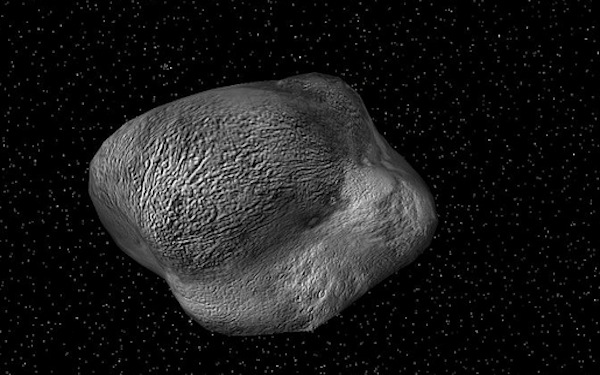
Meet Amun 3554. Doesn’t look like much, right? Little more than a mile wide, it’s one of the smallest M-class (metal-bearing) asteroids yet discovered. Unless it ever decides to smash into us — a theoretical possibility, but extremely unlikely over the next few centuries — it will continue orbiting the sun, unknown and unmolested.
That is, unless Planetary Resources has its way. Planetary Resources is the asteroid-mining company launched Tuesday in Seattle, with backing from Microsoft and Google billionaires, along with the equally prominent James Cameron and Ross Perot Jr.
Its object is to completely dismember poor little rocks like Amun.
That’s because Amun is a goldmine — well, not gold so much. But it does contain a cool $8 trillion worth of platinum, an essential precious metal used in everything from jewelry to fuel cells to computers (and one that’s currently trading at the same rate as gold — $1500 an ounce.) On Earth, only a few hundred tonnes of the stuff are produced every year.
The $8 trillion figure is an estimate based on observations by John S. Lewis, professor of planetary science, author of Mining the Sky: Untold Riches from the Asteroids, Comets, and Planets, and now a consultant to Planetary Resources. He also found 3554 Amun to contain another $8 trillion in iron and nickel, and a mere $6 trillion worth of cobalt.
So, the total payout from one unassuming asteroid? $20,000,000,000,000.
That’s what got Planetary Resources co-founder Peter Diamandis so excited. “There are $20 trillion checks up there waiting to be cashed,” he enthused at a space development conference in 2006.
Trillions and Trillions
And 3554 Amun is hardly alone; it’s just one of the few asteroids that has been submitted to rigorous chemical analysis. Another mile-wide Near-Earth Asteroid, known as 1986 DA, is said to contain 100,000 tonnes of platinum and 10,000 tonnes of gold. That’s worth another couple of trillion. Not too shabby.
How many of these mile-wide metal paydays are up there? We have only a vague idea. Nearly 9,000 Near-Earth Asteroids have been discovered so far. Planetary Resources’ best guess is that represents just 1% of the total.
That’s why the company is focusing its efforts on launching space telescopes first; they’ll do the prospecting, then report back on the lowest-hanging fruit. It’s not inconceivable that Amun could be worth pennies compared to its compadres. Then the asteroid retrieval and mining process — all done by robotic spacecraft — can begin in earnest.
Beating Apple with Ease?
To become the wealthiest company in the world, Planetary Resources need only capture one rock. Less than that, in fact.
Apple, currently the world’s most valuable company, has a market cap of $500 billion. To match that in resources, let alone market cap, Planetary Resources need only mine one-fortieth of 3554 Amun.
Of course, there’s a catch. You couldn’t offload all those metals on the world market at once, for fear of crashing their prices. But the company would still own that much in equity, which would allow them to borrow against it. They would be that wealthy, to all intents and purposes. That’s just how capitalism works.
Still, for all this wealth, platinum and gold may not be the most important thing the asteroid miners are hunting. The water on some ice-bound asteroids could count for more in the long run. Not only does it make the existence of life in space that much easier, but it can also be broken down into the perfect rocket fuels: hydrogen and oxygen.
The more Planetary Resources starts a gold rush, the more important water in space becomes. No wonder the company is already talking about building a chain of orbital and space-bound refueling stations. Ice from asteroids and comets could be the next oil industry.
Check out these interviews with the Planetary Resources team, and let us know in the comments: have they got what it takes to make it?
More About: asteroid mining, Asteroids, planetary resources, space, trending
For more Business coverage:
- Follow Mashable Business on Twitter
- Become a Fan on Facebook
- Subscribe to the Business channel
- Download our free apps for Android, Mac, iPhone and iPad
Read more : This $20 Trillion Rock Could Turn a Startup Into Earth’s Richest Company





0 Responses
Stay in touch with the conversation, subscribe to the RSS feed for comments on this post.